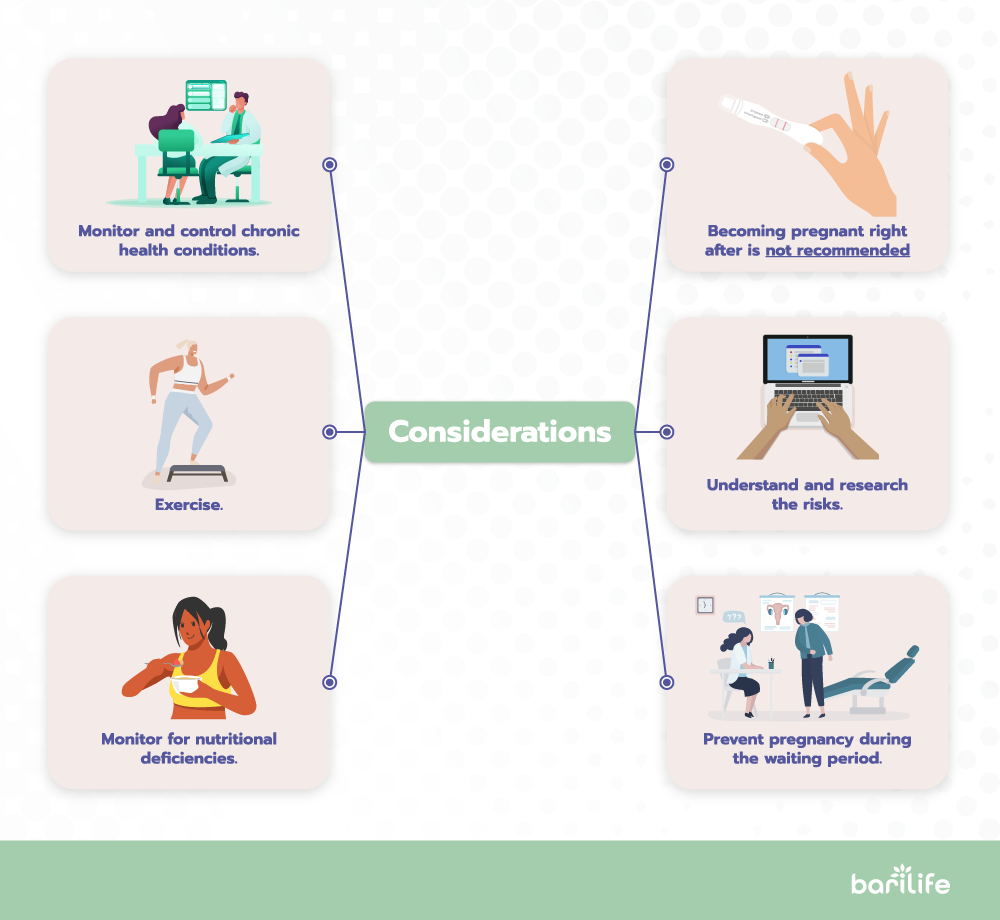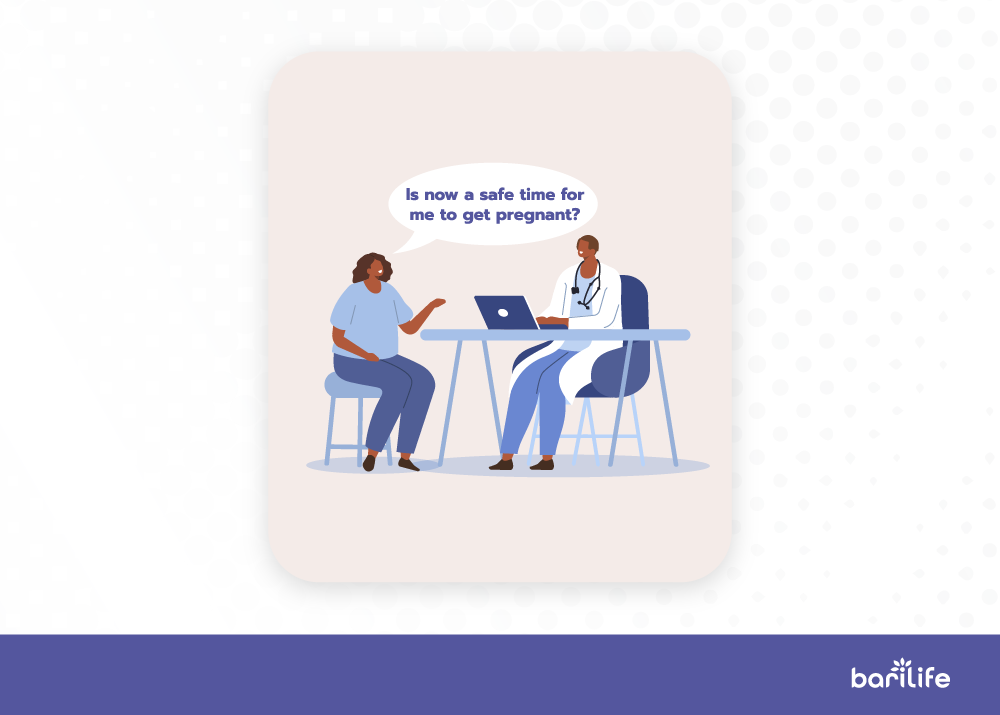Are you considering having gastric bypass surgery, but are unsure of how it will affect your potential to become pregnant? Let’s talk about having a gastric bypass and pregnancy. More than 80% of bariatric weight loss surgeries are done in women and over half of these surgeries are those in women of childbearing age. On the other hand, maybe you’ve had gastric bypass surgery and are pregnant or considering becoming pregnant. This article addresses gastric bypass surgery and pregnancy and ways you can contribute to having a healthy, safe pregnancy.
How Obesity Affects Fertility

If your body mass index (BMI) is 30 or higher, then you are considered to be in the obese range for your height compared to your body weight. Many people who are obese also have or develop comorbidities (also called chronic health conditions), that develop from being overweight and can affect fertility. Let’s review some of the ways obesity can affect your body and fertility.
As we mentioned, obesity can lead to developing comorbidities or chronic health conditions. Some of these health conditions include hypertension, type II diabetes, and high cholesterol. All of these health conditions, if left uncontrolled, can cause a decline in your chances of becoming pregnant. In fact, obesity has been linked to insulin resistance, which causes infertility in both men and women.
Women with obesity are more likely to develop polycystic ovarian syndrome (PCOS). PCOS occurs when there is an imbalance of sex hormones, thus triggering cysts to form on the ovaries. Due to the nature of the hormone imbalance and cysts forming, a woman’s fertility is reduced.
In addition, obesity can lead to problems with ovarian and cervical function. It has also been linked to endometriosis, which can affect a woman’s fertility. These are just some of the factors that can affect your chances of becoming pregnant.
If you haven’t had gastric bypass surgery, expect your primary care provider to recommend losing weight to improve your fertility. They will also most likely refer you to a bariatric surgeon since bariatric surgery has been shown to improve your chances of becoming pregnant. Your surgeon will work with other members of your healthcare team to help determine the best course of action to help improve your chances of becoming pregnant. Alternatively, if you’ve already had bariatric surgery, tell your surgeon that you would like to become pregnant. They can guide you on the next steps and discuss potential risks and concerns when it comes to getting ready for a gastric bypass and pregnancy.
Considerations for a Gastric Bypass and Pregnancy
Next, let’s review some items to consider before, during, and after you become pregnant if you’ve had gastric bypass surgery.

- Becoming pregnant right after gastric bypass surgery is not recommended. The recommended wait period to try to become pregnant is at least 12 to 24 months after surgery. Why? This is to prevent surgical complications that can result from pregnancy after gastric bypass surgery and to ensure you are in good health. Remember, it has been shown that your fertility increases with weight loss, without the need for fertility treatments.
- Prevent pregnancy during the waiting period. To make sure your body has adequately healed after gastric bypass surgery, it’s imperative to consider preventing pregnancy as well. Since absorption through your digestive tract is impacted after gastric bypass surgery, oral birth control is sometimes not as effective. Make sure to discuss pregnancy prevention with your obstetrician and bariatric surgeon so that they can recommend the best birth control method. They will most likely recommend an intrauterine device or implant.
- Monitor for nutritional deficiencies. Due to the alterations in your digestive tract, gastric bypass surgery often leads to nutritional deficiencies, which can impact pregnancy. Anemia is the most common deficiency, but low levels of vitamin B12, iron, and folate are also common. Vitamins and proper nutrition are imperative for fetal growth and development. Deficiencies can lead to congenital conditions, preterm birth, growth restrictions, etc. Therefore, it’s crucial to keep follow-up appointments and talk to your surgeon and healthcare team to let them know you are considering becoming pregnant. Remember, prenatal care starts before pregnancy. Most likely your surgeon will refer you to a nutritionist to discuss dietary changes and to make sure you are getting your daily amounts of vitamins and nutrients.
- Monitor and control chronic health conditions. As mentioned before, many people who are obese also have chronic health conditions or comorbidities. People who are obese and have prediabetes are more susceptible to developing gestational diabetes. Also, if you’ve been diagnosed with hypertension (high blood pressure), this puts you at a higher risk of developing preeclampsia. Therefore, to ensure you have a healthy, safe pregnancy, any comorbidities must be under control before, during, and after childbirth. Additionally, many medications pose a potential risk of fetal harm, and your healthcare provider will need to make adjustments to your medications.
- Exercise. After gastric bypass surgery, exercise is a crucial component of achieving weight loss. Exercise is also important during pregnancy, as research has shown it can prevent gestational diabetes.
- Understand and research the risks. Before deciding to become pregnant, discuss the risks with your bariatric surgeon and a high-risk obstetrician. Two of the common risks associated with gastric bypass surgery and pregnancy are fetal growth impairment conditions, such as intrauterine growth restriction (IUGR) and small for gestation age (SGA). Your obstetrician will need to screen and monitor you closely for potentially developing these and other conditions during your pregnancy.
If you’re considering becoming pregnant, speak to your surgeon and healthcare team immediately. If you do not have a high-risk obstetrician or nutritionist, ask your surgeon for a referral. While pregnancy is safe and many complications can be prevented, you and your healthcare team will work together to increase your chances of having a healthy, safe pregnancy.





What are your tips and tricks to post-bariatric success?